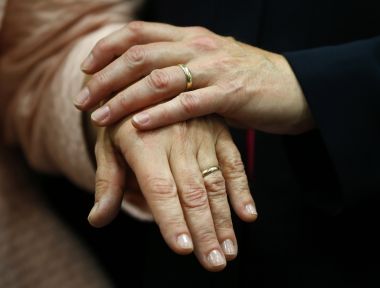Colorado Supreme Court orders halt to same-sex marriages in Denver

The Colorado Supreme Court has ordered Denver and Adams County on Friday not to issue marriage licenses to gay couples until a final resolution is made in the case.
The state has appealed a 9 July court decision that found its voter-approved gay marriage ban unconstitutional, and the Supreme Court has now ruled that the two counties must not distribute licenses until the case is resolved.
The Denver County Clerk's office has issued 108 marriage licenses to gay couples since July 10.
Clerk Debra Johnson expressed disappointment in the Court's ruling.
"There are some things we do for ourselves, but there are things, especially as an elected official, that must be done for others," she said in a statement. "One day, I hope every Coloradan will experience marriage fully, equally and without prejudice."
The Adams County Clerk's office has not issued any marriage licenses to gay couples since the ruling.
In the court's most recent ruling, however, it did not rule on the legality of the licenses already issued, and declined to rule on whether other counties can issue gay marriage licenses.
University of Denver law professor Nancy Leong has claimed the latest ruling means that Boulder, Pueblo, and other counties can legally issue marriage licenses to same-sex couples.
"The court can only do what the plaintiffs ask them, and these plaintiffs only asked them to stay Denver/Adams [counties]," she told the Associated Press.
However, Colorado Attorney General John Suthers expressed hope that other counties will stop issuing the licenses "without requiring more wasteful litigation," in a statement released Friday. But Boulder and Pueblo County clerks have stated that their offices will continue to issue the licenses.
In further developments, a separate request to expedite the gay marriage ban appeal in the Colorado Supreme Court was also denied Friday.
Attorney Ralph Ogden, who represents one of the nine gay couples in the lawsuit, said an expeditious case would have benefited all parties involved.
"I'm disappointed the court didn't expedite the appeal," he told the Denver Post. "They could have granted the request and it could have resolved a lot of uncertainty in Colorado."
The Colorado Supreme Court is expected to hear the case in 2015.











